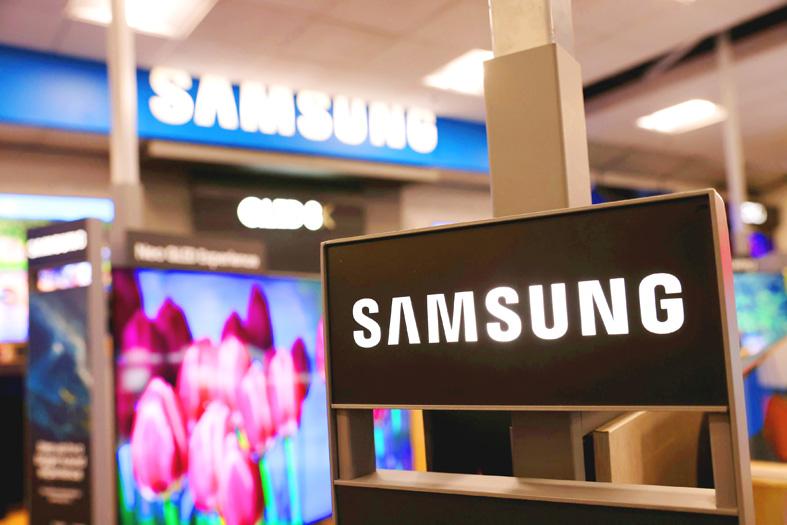Samsung Electronics Co is to build an advanced US chip plant in Texas as US President Joe Biden’s administration prioritizes supply chain security and greater semiconductor capacity on US soil.
South Korea’s largest company has picked the city of Taylor, about 50km from its manufacturing hub in Austin, a person familiar with the matter said.
The local government pulled out the stops to snag Samsung, including waiving 90 percent of property taxes for a decade and 85 percent for the following 10 years, the person said.

Photo: Reuters
Samsung and Texas officials were to announce the decision yesterday afternoon, people familiar with the matter said.
A Samsung representative said that it had not made a final decision and declined further comment.
Samsung is hoping to win more US clients and narrow the gap with Taiwan Semiconductor Manufacturing Co (TSMC, 台積電).
Its decision, which came months after de facto Samsung leader Jay Y. Lee was released from prison on parole, follows plans by TSMC and Intel Corp to spend billions on cutting-edge facilities globally.
The industry triumvirate is racing to meet a surge in demand following COVID-19 restrictions that have stretched global capacity, while anticipating that more connected devices from vehicles to homes will require chips.
The new plant would augment Samsung’s already large presence in the area, where it has invested about US$17 billion to date on a sprawling complex that houses more than 3,000 employees and fabricates some of the country’s most sophisticated chips.
Samsung is planning to invest another US$17 billion and create about 1,800 jobs over the first 10 years, documents that the company submitted to Taylor officials showed.
South Korea’s Yonhap news agency and the Wall Street Journal had reported earlier on Taylor’s selection.
The Biden administration has repeatedly voiced the need to increase chip production in the US, saying that it is the best way to compete with China and mitigate supply chain disruptions, such as the one stemming from COVID-19.
Last month, the US created an “early alert system” to detect COVID-19-related shocks.
To identify potential issues, it asked producers and consumers of semiconductors to complete a survey about inventories, demand and delivery systems.
The White House has also called on Democrats in the US House of Representatives to pass a US$52 billion bill known as the CHIPS Act, which would fund domestic semiconductor research and manufacturing.
Administration officials have pointed to the bill when pressed about security concerns in Taiwan, the world’s foremost chip producer.
US Secretary of Commerce Gina Raimondo said that the US Congress should pass the legislation as “quickly as possible” when asked if the US needed a clearer defense strategy related to Taiwan.
Samsung is going head-to-head in Intel’s backyard with TSMC, which is on track to start production on its own US$12 billion chip plant in Arizona by 2024.
Its envisioned US foundry is to adopt ASML Holding NV’s extreme ultraviolet lithography equipment and TSMC aims to mass-produce 3-nanometer chips via so-called Gate All Around technology next year or shortly thereafter, employing technology that is expected to more precisely control current flows across channels, shrink chip areas and lower power consumption.

South Korea’s equity benchmark yesterday crossed a new milestone just a month after surpassing the once-unthinkable 5,000 mark as surging global memory demand powers the country’s biggest chipmakers. The KOSPI advanced as much as 2.6 percent to a record 6,123, with Samsung Electronics Co and SK Hynix Inc each gaining more than 2 percent. With the benchmark now up 45 percent this year, South Korea’s stock market capitalization has also moved past France’s, following last month’s overtaking of Germany’s. Long overlooked by foreign funds, despite being undervalued, South Korean stocks have now emerged as clear winners in the global market. The so-called “artificial intelligence

Chinese artificial intelligence (AI) start-up DeepSeek’s (深度求索) latest AI model, set to be released as soon as next week, was trained on Nvidia Corp’s most advanced AI chip, the Blackwell, a senior official of US President Donald Trump’s administration said on Monday, in what could represent a violation of US export controls. The US believes DeepSeek will remove the technical indicators that might reveal its use of American AI chips, the official said, adding that the Blackwells are likely clustered at its data center in Inner Mongolia, an autonomous region of China. The person declined to say how the US government received

‘SEISMIC SHIFT’: The researcher forecast there would be about 1.1 billion mobile shipments this year, down from 1.26 billion the prior year and erasing years of gains The global smartphone market is expected to contract 12.9 percent this year due to the unprecedented memorychip shortage, marking “a crisis like no other,” researcher International Data Corp (IDC) said. The new forecast, a dramatic revision down from earlier estimates, gives the latest accounting of the ongoing memory crunch that is affecting every corner of the electronics industry. The demand for advanced memory to power artificial intelligence (AI) tasks has drained global supply until well into next year and jeopardizes the business model of many smartphone makers. IDC forecast about 1.1 billion mobile shipments this year, down from 1.26 billion the prior

FORTUNES REVERSED: The new 15 percent levies left countries with a 10 percent tariff worse off and stripped away the advantage of those with a 15 percent rate In a swift reversal of fortunes, countries that had been hardest hit by US President Donald Trump’s tariffs have emerged as the biggest winners from the US Supreme Court’s decision to strike down his emergency levies. China, India and Brazil are among those now seeing lower tariff rates for shipments to the US after the court ruled Trump’s use of the International Emergency Economic Powers Act to impose duties was illegal. While Trump subsequently announced plans for a 15 percent global rate, Bloomberg Economics said that would mean an average effective tariff rate of about 12 percent — the lowest since